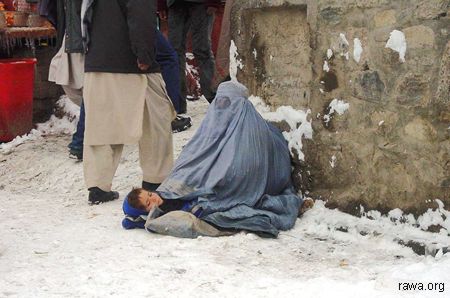Violence against women in Afghanistan remains dramatic – UN expert
From forced child marriages entailing physical and sexual abuse to the public execution of a woman on local council’s orders, from girls burning themselves to death out of despair to impunity for abusers, violence against women in Afghanistan is a dramatic problem that must be addressed now, a top United Nations expert said today.
“Violence against women remains dramatic in Afghanistan in its intensity and pervasiveness, in public and private spheres of life,” the Special Rapporteur of the UN Commission on Human Rights on Violence against Women, its Causes and Consequences, Yakin Ertürk, told a news briefing in Kabul, the Afghan capital, at the end of a 10-day visit.
The three and a half years since the fall of the Taliban regime, which repressed women’s rights, have seen considerable change in the legal and institutional framework, but “action has to be taken now to protect women, to save lives,” she added, outlining a list of measures that appear feasible in the short term.
These include launching media campaigns to inform the public that forced and child marriages violate fundamental precepts of Islam, and clearly establishing the ‘marriage’ of a girl-child as a crime subject to prosecution and punishment.
Tragic facts:

- At least 6.5 million people out of a population of between 21 and 26 million are dependent on food aid, and there is a very real risk of famine.
- Afghanistan has one of the lowest life expectancies in the world - just 44.5 years.
- A fifth of children die before they reach the age of five.
- About two million Afghans are now living abroad, most of them in Iran and Pakistan.
- In Kabul, an estimated 500,000 people are homeless or living in makeshift accommodation.
- Only 40 per cent of Afghan children are vaccinated against major diseases, and just 25 per cent of the population has access to safe drinking water and adequate sanitation. There is just one doctor per 6,000 people, and one nurse per 2,500 people.
- Some 72,000 new cases of tuberculosis are reported every year. Women account for most TB deaths.
- Up to 100 people are killed or wounded by mines and unexploded ordnance every month
- Every year an estimated 400,000 Afghans are affected by natural disasters.
- Less then 6% of Afghans have access to electricity, that too partly.
Police and prosecutor's offices must not return girls and women who escape domestic violence to their families unless their safety can really be ensured, safe havens for women at risk must be created and strengthened and donor support for Afghanistan should be linked to human rights and the protection of women, she added.
“The present time constitutes a unique window of opportunity that should not be missed,” she declared.
Most people she spoke to pointed to forced and child marriages as the primary source of violence against women, Ms. Ertürk said. “In addition to being in themselves serious forms of violence, forced and child marriages in combination with polygamy considerably increase the likelihood that women will be subjected to violence within the family, including sexual violence by significantly older males,” she added.
She cited “one very dramatic example which affected me tremendously” of an eight-year-old girl, now under protection, who was sold by her mother at age six for marriage although neither Civil Law nor Islamic Sharia can accept that a six-year-old girl is marriageable.
“This girl and others like her that I have talked to, who were not lucky enough to end up in a protective area, are abused physically as well as sexually. Not only by the designated husband, but until the designated husband grows up, other males in the family may abuse her,” she said. “I was just told at a Government meeting a while ago that girls are married off to families who in turn use them to sell their blood, or use them as prostitutes,” she added.
“In only an exceedingly small fraction of cases will any sanction be imposed on the perpetrators of domestic violence,” she noted, adding that many women have no alternative but to endure such violence since unaccompanied women have no place in the public space and are automatically suspected of being engaged in sexual offences.
“Once a girl or women has spent a night away from family control, this might constitute a dead end in her life. The stigma attached thereto often makes her return impossible, as she is either refused or accepted only to face punishment, often death.”
She referred to the case of a woman called Ameena who was stoned or beaten to death because of a “fatwa by the local authorities for her murder.”
“The violence has to come to an end. There is no reason under the sun that can legitimize any of these acts, if the Government is going to gain legitimacy and credibility it has to find ways of dealing with these issues,” she said.
She also cited cases of self-immolation in the town of Herat. “These girls are burning themselves to death because they have no other option in life to escape violence,” she declared. “They are committing suicide in order to escape a life full of violence, not only from their husbands or fathers, but sometimes even by mothers-in-law, surprisingly. So being women does not free one from exercising violence unfortunately."
[RAWA Homepage] [More reports from Afghanistan] [RAWA Photo Gallery]
http://www.rawa.org